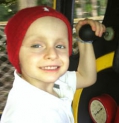Optimizing a CD5 CAR Approach to Treat Children with T cell Leukemia and Lymphoma
Background
T cells transduced with CD19 chimeric antigen receptors (CARs) have had dramatic therapeutic effects in children with B cell acute lymphoblastic leukemia (ALL). This strategy has now progressed to licensing trials. However, utilizing CARs to target T cell malignancies is challenging due to shared expression of most targetable antigens between malignant and normal T cells. This potentially leads to killing CAR expressing T cells.
CAGT investigators have developed a novel CAR targeting CD5 – a surface receptor expressed in most normal and malignant T cells. Investigators demonstrated the ability of CD5 CAR T cells to achieve clinically relevant numbers. CD5 CAR T cells demonstrated only limited fratricide, while effectively eliminating CD5+ leukemic T cells in vitro and in mouse xenograft models.
Project Goal
In this proposal we will perform follow up studies to understand mechanisms regulating differential killing of normal versus malignant T cells to ensure its best performance in patients. We will evaluate the immune synapse and undertake biologic testing of a number of constructs to determine the optimal configuration of CD5 CAR to ensure enhanced persistence and performance of CD5 CAR T cells. Successful completion of this project will lead to creation of a CD5 CAR clinical trial in children with T cell leukemias and lymphoblastic lymphoma.

